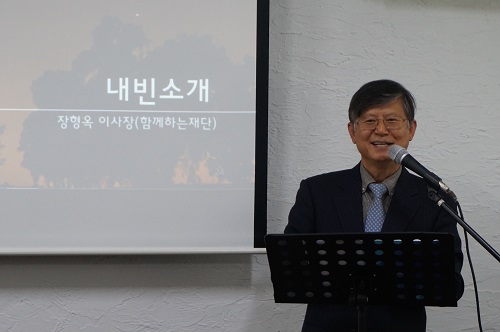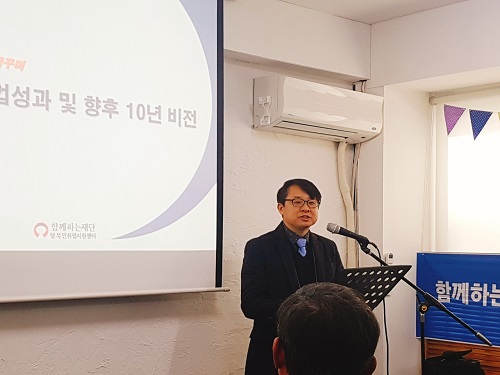Unification Media Group (UMG): The most important asset to provide North Korean defectors with as they settle into their new lives in South Korea is self-reliance. The Togetherness Foundation has been operating a Re-settler Employment Assistance Center in Omokgyo, Seoul, for the past ten years. The organization celebrated its milestone anniversary by gathering together companies that support defector employment, schools, and other members of the community. Reporter Kim Ji Seung was in attendance to cover the event.
Kim Ji Seung (Kim): Upon its launch ten years ago, the Togetherness Foundation’s Re-settler Employment Assistance Center was the first civic organization of its kind in South Korea.
Under a banner reading, “A Miraculous 10 Years, And More to Come!” scholars, government officials, and defectors alike extended their thanks to the center. Jang Hyeong Ok, the foundation’s chairman, opened the event by delivering a poignant opening address. This was followed by a discussion of the center’s work and an accordion musical performance.
“It has been ten years since we embarked on our mission to help North Korean defectors resettle in the South so they can live healthy, productive lives as members of South Korean society. For the past ten years, the center has achieved tangible results in helping defectors adjust to life here through continuous hard work and investment,” Chairman Jang said.
“In the future, the center will look to lead the charge in efforts to help defectors make a stable social transition.”
UMG: We heard that there was a special performance. Can you tell us about that?
Kim: Yes that’s right. Center employees and defector Jina Jeong prepared a special performance to celebrate the center’s work. Everyone in the audience was clapping and cheering. It was a very festive atmosphere.
Most defector settlement support comes from the government. So it’s impressive that the center has a ten-year record of contributing to its mission despite the challenges. The Unification Ministry’s Baek Sang Yeol praised the center, saying, “Employment is the core issue with regard to building self-sufficiency, but this center has also helped with mentoring and post-employment support delivered around the clock. In future, we expect to create policies that facilitate a more free and open space to support this mission by consolidating the views of civic groups and churches.”
“The government has resolved to implement policies to help improve social cohesion and quality of life for defectors. We want to switch to a model that provides real support for their needs. Defectors are true members of our society. We need to work hard to promote the image that defectors are our neighbors for all South Korean citizens to embrace,” Baek continued.
UMG: Can you describe what sorts of activities the center has undertaken for the last 10 years?
Kim: Chairman Jang said that over the past ten years 2.6 billion won (~US $2.4 million) has been invested to support the resettling and employment of over 1,000 defectors, including 400 job placements. He also extended his gratitude to the principal supporters of the center, including the Export Import Bank of Korea, Hyosung Inc., Yeomyung School, and Bae, Kim, and Lee LLC.
Choi Gyeong Il, head of the Togetherness Foundation’s Re-settler Employment Assistance Center, added, “We have provided a one-stop, complete service for adult employment in support of 500 individuals, resulting in 283 successful placements. We have also supported 300 university students, and matched 131 of them with jobs. Recently, we created an “Adapt to School” program. One student who attended last year was hoping to find work in the chemical industry and was hired by LG Chemical. Another student dreamed of becoming a Chinese-translator/interpreter, and found employment in that field within a year.”
UMG: It seems that the secret to the center’s success is that it helps the program participants build up all the job skills needed to succeed. Are there any other things that the center offers its participants?
Kim: The center stays with each defector and offers continuous support, even when they struggle to receive placement in a desired field. Jeon Sae Gyeong, a defector currently working as a manager at a tax firm, said, “When I first started looking for work, I had no preparation whatsoever. After six months, I felt a tremendous sense of shame because I still couldn’t find work. I realized that having a skills qualification certificate was not the only thing needed to find and maintain employment. When I failed, I withdrew from society, and didn’t even want to see my family. But the center embraced me and helped heal those wounds. They helped teach me the skills and gave me the inspiration needed to start looking for work again.”
Seoul National University PhD and defector Kim Jeong Ae said, “There’s a lot of difficulty, but it’s important not to quit and to gain lots of experience in South Korea. (After unification), there will be even more opportunities to use our skills. Going forward, I hope that we can strive with diligence and strength to adapt to life in South Korea, and then contribute meaningfully to the unification process.”



















